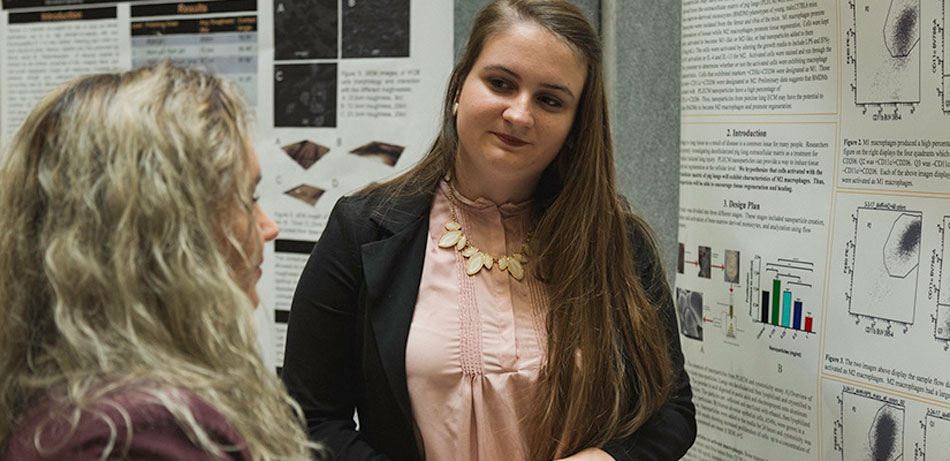By Rebecca E. Jones
The Dean’s Undergraduate Research Initiative (DURI) Symposium showcased the work of juniors and seniors who have completed rigorous, year-long research fellowships in VCU’s engineering labs. The Nov. 22, 2017, symposium took place in the School of Engineering East Hall Qimonda Atrium and featured conference-style poster presentations. Biomedical engineering major Alexandria Ritchie, computer science major Clint Cuffy and chemical and life science engineering major Tien Vuong took top honors.
Barbara D. Boyan, Ph.D., Alice T. and William H. Goodwin Chair and dean of the VCU School of Engineering, instituted DURI in 2013. DURI gives undergraduates a long-term, immersive research experience alongside faculty, graduate student and postdoctoral fellow mentors. It also gives graduate students and postdoctoral fellows the opportunity to develop managerial and mentorship skills.
“I’ve been a researcher for a lot of years,” Boyan said to the DURI fellows at the awards ceremony. “Now you know what the rest of us know: there is nothing more fun than gathering data, analyzing it, and then seeing your name on an abstract, publication or poster. If you stay in academe, you get to keep doing that.” To reinforce the point as winners and mentors smiled for photos, Boyan called out “Grad school!” — instead of “Cheese!”
Ritchie, a senior, received first place for a study using nanoparticles to regenerate lung tissue. Her project suggests that introducing nanoparticles to the lung’s macrophages (cells that engulf and digest cellular debris) changes their phenotype and may encourage tissue growth and healing. Her research took place in the laboratory of Rebecca Heise, Ph.D., associate professor in the Department of Biomedical Engineering. Ritchie’s graduate student mentor was biomedical engineering doctoral candidate Patrick A. Link.
“I would tell any undergraduate even considering research to apply for DURI. It can really open up your entire college world with new possibilities and the chance to work on projects that could change your field,” Ritchie said.
Cuffy, a senior, received second place for a study that compared and contrasted various word embedding generation models and concept vectors in biomedical texts for semantic similarity (such as “liver-organ”) and relatedness (such as “headache-aspirin”). The project will ultimately help improve the automated cataloging and retrieving of information from massive text databases. Cuffy’s study was conducted in the laboratory of Bridget T. McInnes, Ph.D., assistant professor in the Department of Computer Science. His mentor was doctoral candidate Sam Henry.
Vuong, a junior, received third place for her investigation of nanoreactors containing gold nanoparticle catalysts that combine reaction and separation to improve efficiency and minimize hazardous waste in liquid-phase chemical reactions. Vuong worked in the lab of Christina Tang, Ph.D., assistant professor in the Department of Chemical and Life Science Engineering. Her mentor was Ph.D. student Andrew Harrison.
